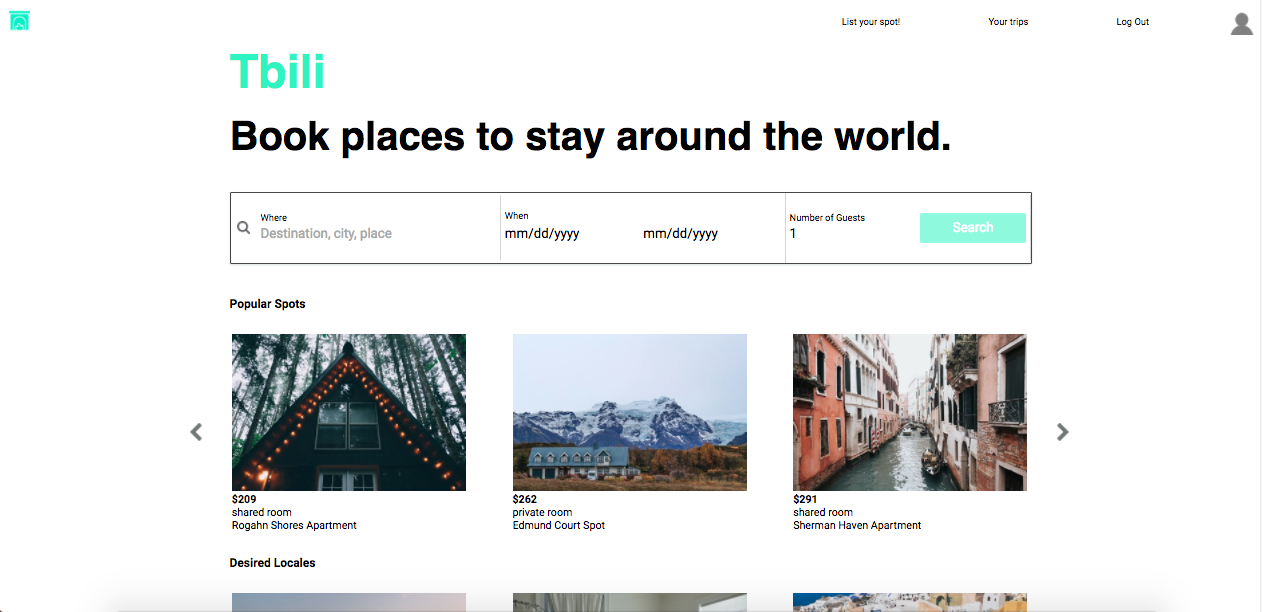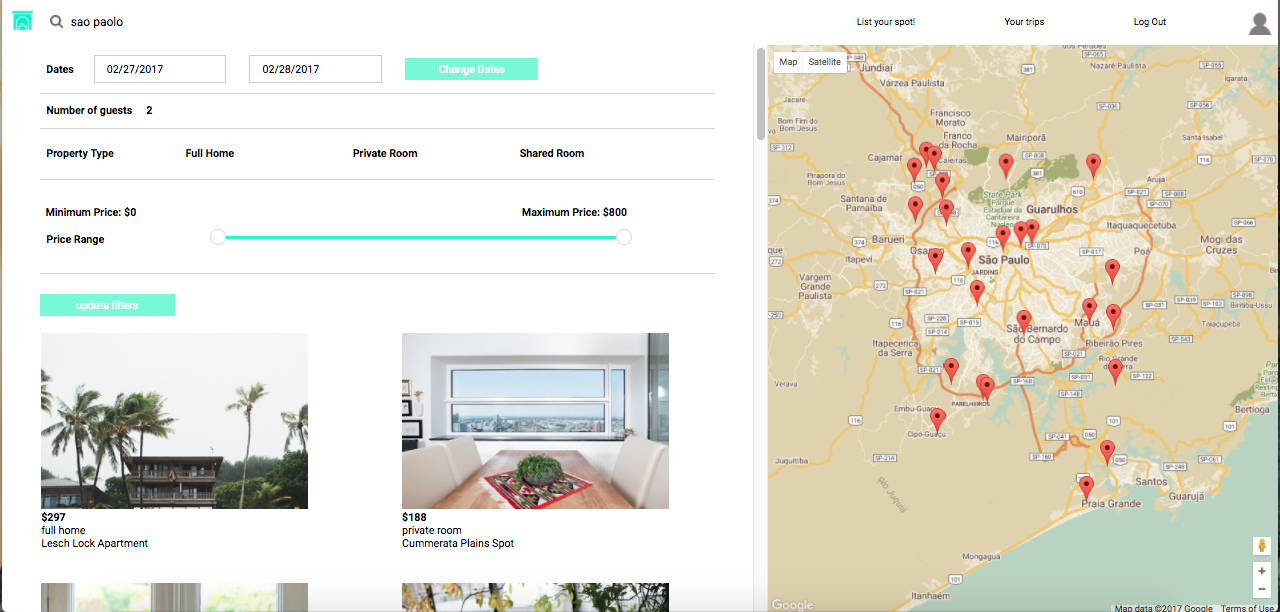Check out a live version of Tbili here: Tbili Live
Tbili is a fullstack web application modeled after Airbnb’s website. It uses Ruby on Rails on the back end in conjunction with React/Redux on the front end to deliver an interactive, single page web application.
Tbili features a simple yet efficient schema design on the back end. All customers of Tbili are placed in the “Users” table, as every user can be a host, guest, or both. Users can become hosts by listing their “Spot”, which holds information about the size and amenities of a listing. Bookings is the critical link between every guest, host, and listed spot. Each booking has the ability to hold a review of the guest and the spot, allowing for easy fetching of spot-related information while adhering to normalized database principles.
Attention was given to adhere to the parameters of redux - accordingly every action that mutates the state of Tbili is enacted through the “Redux” cycle. In so doing, an arbitrary number of sources of information - whether from users, the server, or third party APIs, can be added to the application without concern for producing an unpredictable final application state.
A hand rolled destination carousel was created in order to emulate Airbnb’s front page. The carousel uses one “container component” that filters all spots designated as “featured” in the database into categories (for example, filtering based on price). All spots are then passed through a “middle layer”, the purpose of which is to allocate spots to their proper presentational component. This allows for arbitrarily large numbers of presentational carousel components to be displayed with only one “fetch” hitting the server and grabbing the spots.
One of the most important features of Tbili is a search function that incorporates Google maps. This functionality is achieved using “addresses” - streets, cities, states, etc. that can be searched by users. The address information is collected in a form component, and before being submitted, sent to the Google Geocoder API. From the Google API, the boundaries of the address are extracted, and these become the boundaries of the google map on the search results page. In addition, every time the Google map is moved, the boundaries are dynamically updated and different “spots” are fetched. This allows for a highly interactive user experience, where users have total control for how they want to find their future rental spots using an intuitive interface.
The search form must first hit the Google Geocoder API with the searched address, then when the AJAX response arrives, the boundaries must be parsed for the Google Maps API:
submitForm(e) {
e.preventDefault();
if (this.state.address === "") {
this.props.fetchSearchSpots({
start_date: this.state.start_date,
end_date: this.state.end_date,
guest_no: this.state.guest_no,
}
).then(() => this.props.router.push("/search"));
} else {
fetchBoundaries(this.state.address)
.then(rawBounds => {
return parseBoundaries(rawBounds);})
.then(parsedBounds => this.props.fetchSearchSpots(
{bounds: parsedBounds,
start_date: this.state.start_date,
end_date: this.state.end_date,
guest_no: this.state.guest_no}
)
).then(() => this.props.router.push("/search"));
}
}Spot creation is achieved through a multi-page form, allowing users to submit information on pricing, amenities, spot image and location in a single process. The first page is a simple form, with errors largely handled using HTML input error messages. The second page incorporates the Paperclip gem, allowing users to upload an image which is stored using AWS’ ‘Simple Storage Service.’ The last step allows users to input their address and updates a google map to show them exactly how their spot will look on the map when presented to users.
The Form is held within one 'mother' component, which passes down a callback to each child component. The callback allows the children to change the state of the mother:
handleStepOne(form) {
this.setState({ newSpot: merge(this.state.newSpot, form), currentForm: 1 });
}
handleStepTwo(form) {
this.setState({ newSpot: merge(this.state.newSpot, { imageFile: form }), currentForm: 2 });
}
...Availability in the Tbili database is stored in ‘blocks,’ allowing hosts to have control over when they will have guests. For example, a host may make a ‘block’ for the summer months, and then another ‘block’ for December, meaning this is the only time she will host guests in her spot. When a booking is created, it holds a foreign key that points to the availability block in which it was created. While this does add some extra complexity, what it allows for is to quickly group bookings by their containing availability block. With bookings grouped, it becomes easy to find the days for a spot which exist in the availability block but do not have a booking.
This solution solves a number of other problems, such as not having to keep each available day as a row in the database (given database size constraints) and dealing with date ranges:
def get_availability
unbooked_days = []
availability_blocks = self.availabilities.includes(:bookings)
availability_blocks.each do |availability_block|
booked_days = []
availability_block.bookings.each do |booking|
booked_days += (booking.start_date..booking.end_date).to_a
end
(availability_block.start_date..availability_block.end_date).each do |day|
unbooked_days.push(day) unless booked_days.include?(day)
end
end
unbooked_days
endSome features that are planned for inclusion include:
- Incorporation of 'Immutable.js' for closer adherence to Redux principles
- Multiple login sessions per user, so users can login from multiple devices
- Data collection for user search, for a more bespoke home screen according to user taste

